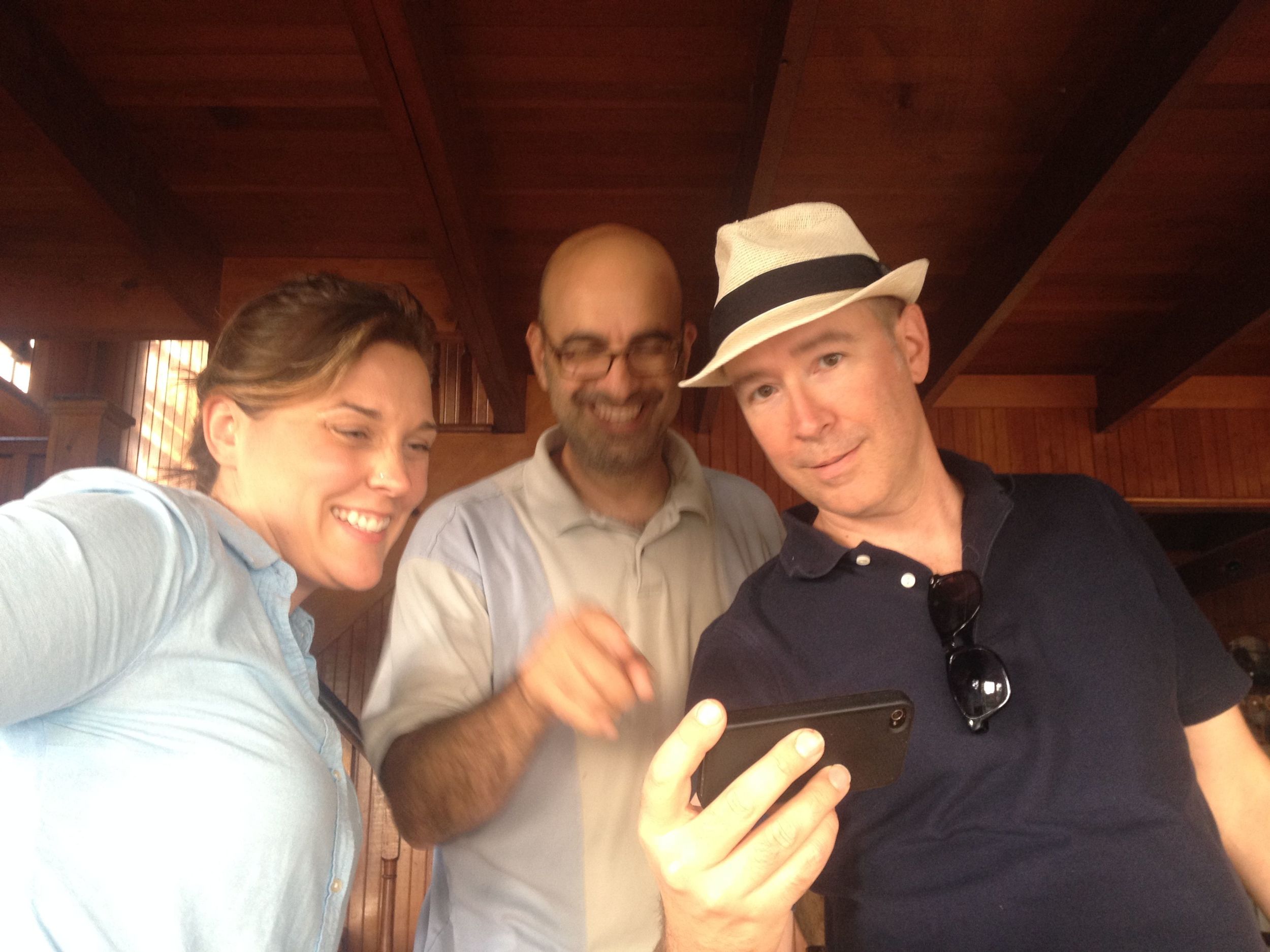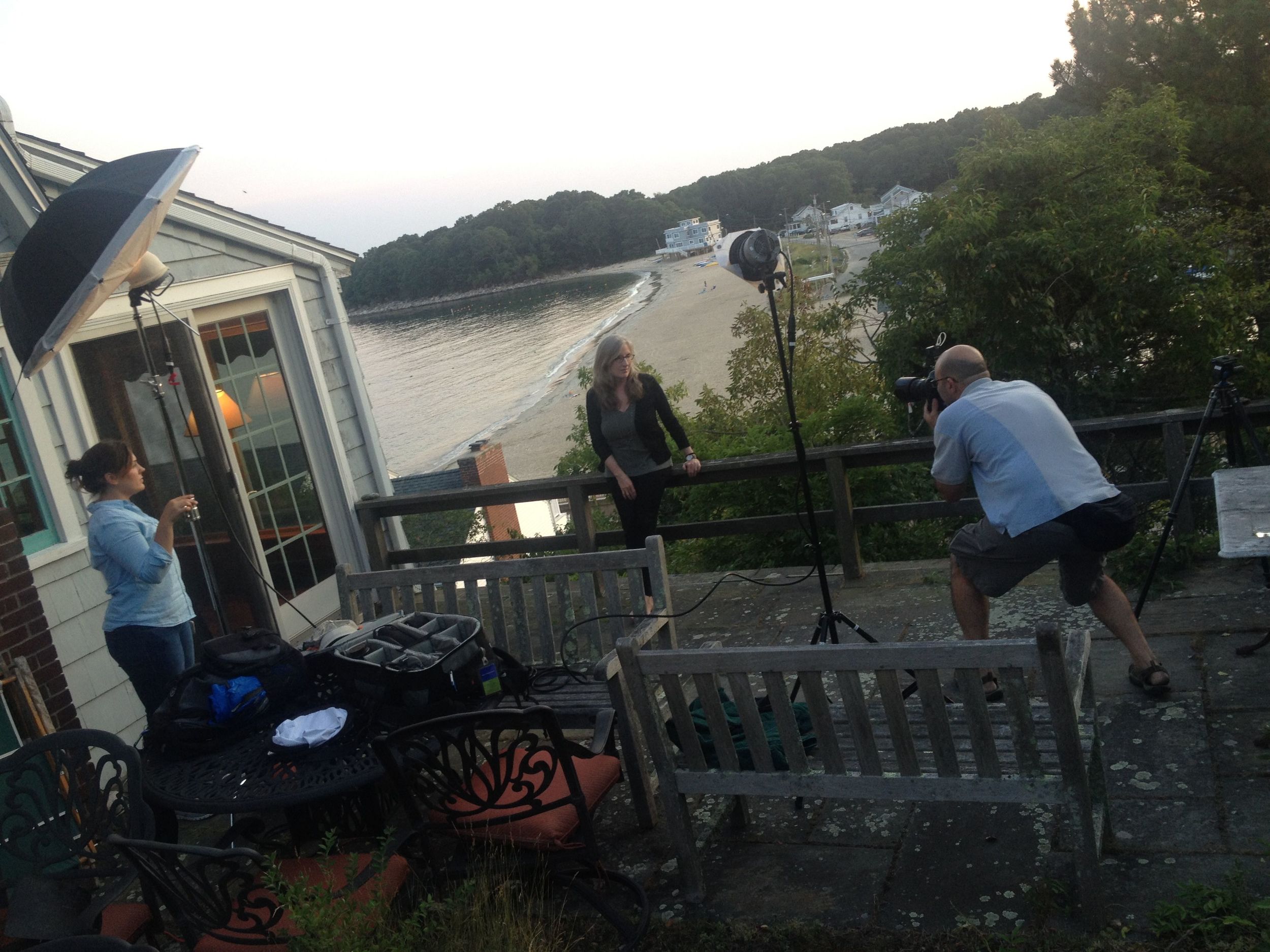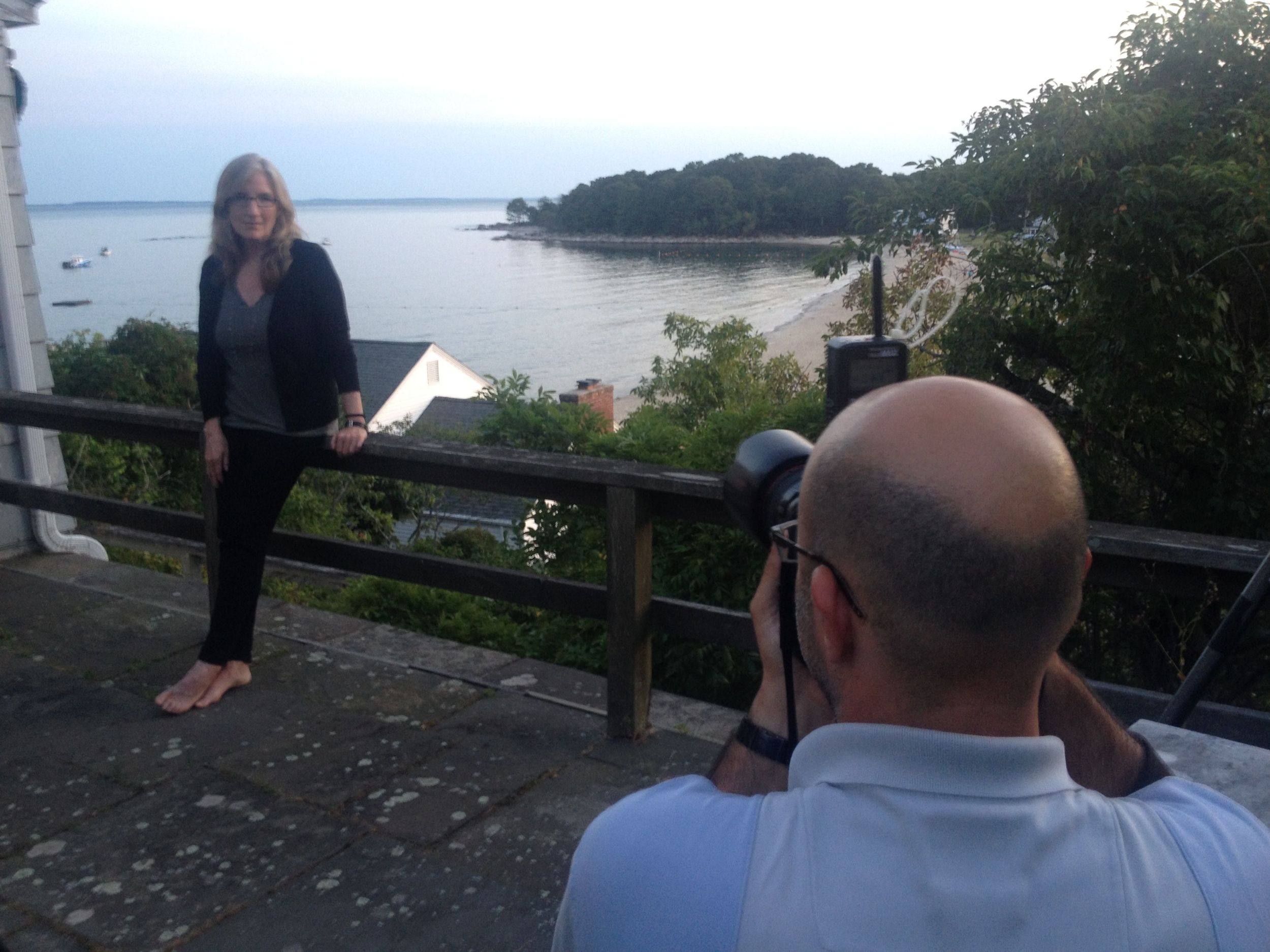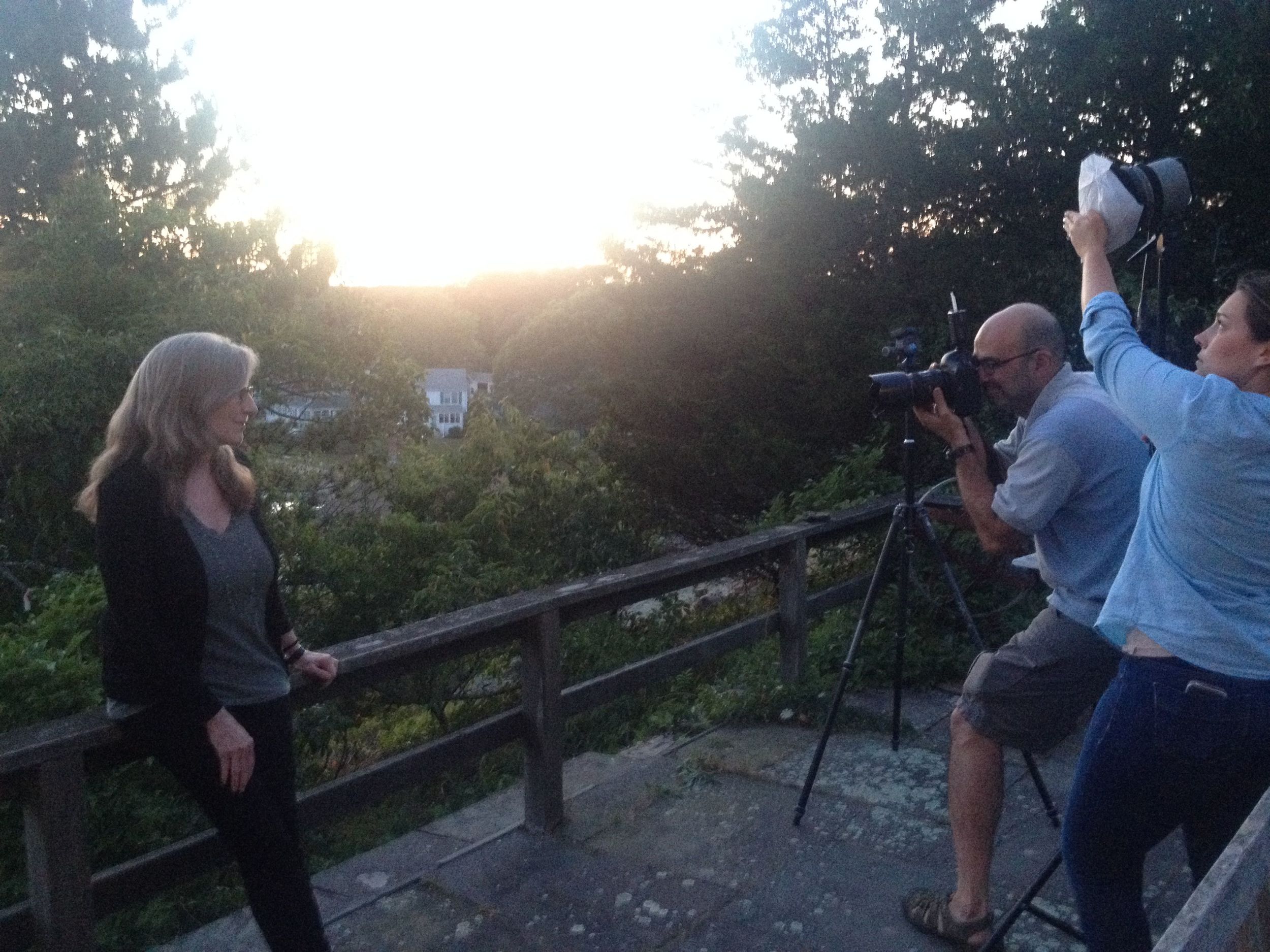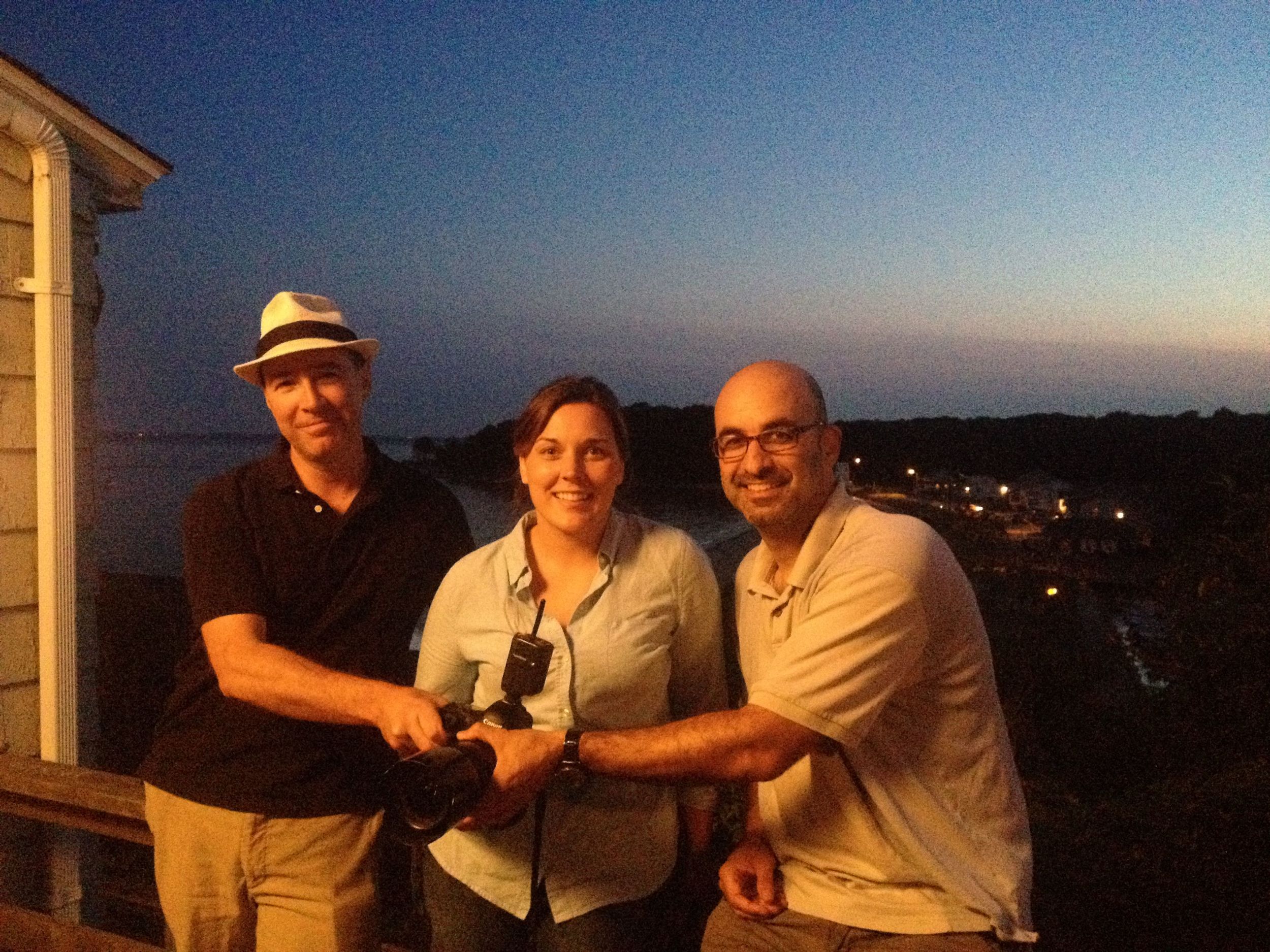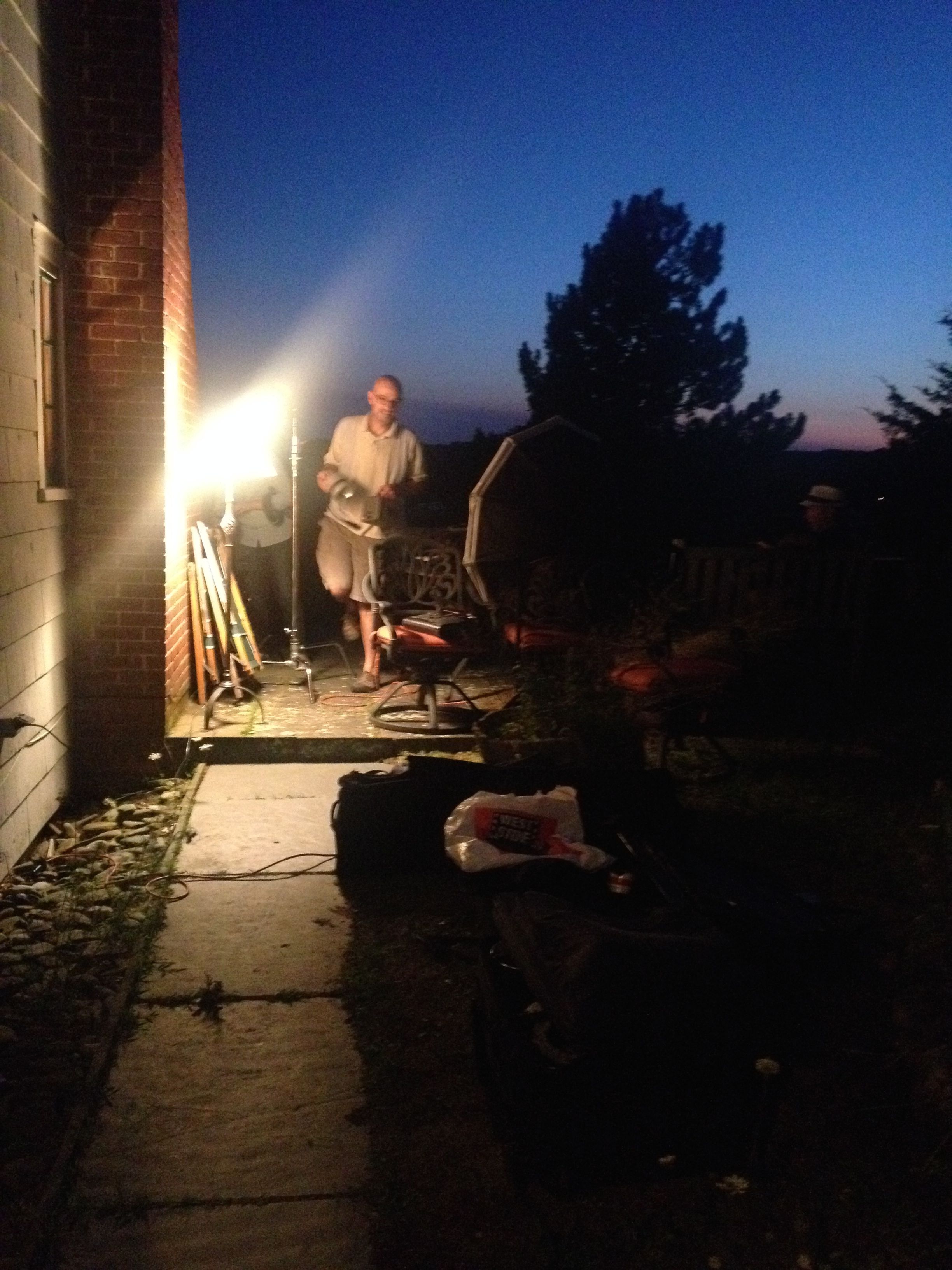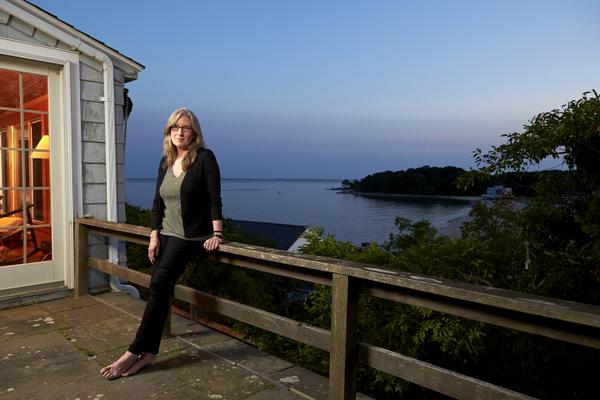Hi all! Enter here for the chance to win a copy of the e-book of Last Day. Thomas & Mercer is giving away 100 copies on Goodreads. What a great way to start 2020! Good luck if you enter. —Luanne
Read MoreLast Day
Although Last Day is about a terrible crime, it still has everything you've come to expect from my writing: family, friendship, a coastal setting (Black Hall, on the Connecticut shoreline, familiar to my readers.) I can't wait for you to read it. –Luanne
Read MoreConnecticut College Magazine Photo Shoot
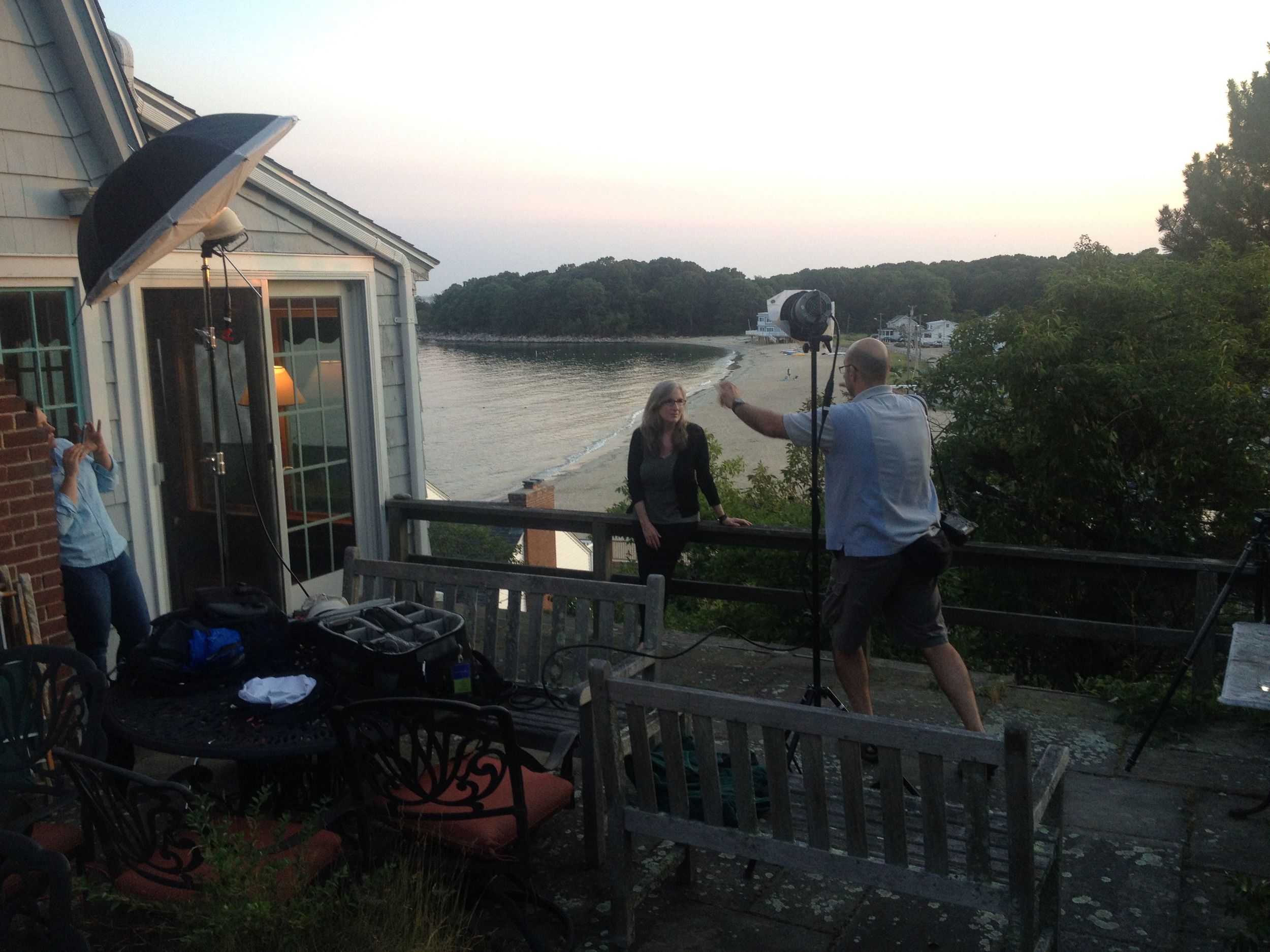 I was so honored to learn Connecticut College wanted a profile of me for CC Magazine. Amy Martin, the magazine's wonderful editor, made it all happen. Ben Parent, art director, and Bob Handleman, photographer, and Bob's assistant--and fine photographer in her own right--Lindsey Platek came over one August day and we had a great time on the photo shoot. Ben Parent is a real visionary, and Bob is a great artist, and they made my little cottage at Hubbard's Point look so magical. Not only that, Ben provided a great soundtrack, thanks to his band Rivergods. Here are some photos from that day...
I was so honored to learn Connecticut College wanted a profile of me for CC Magazine. Amy Martin, the magazine's wonderful editor, made it all happen. Ben Parent, art director, and Bob Handleman, photographer, and Bob's assistant--and fine photographer in her own right--Lindsey Platek came over one August day and we had a great time on the photo shoot. Ben Parent is a real visionary, and Bob is a great artist, and they made my little cottage at Hubbard's Point look so magical. Not only that, Ben provided a great soundtrack, thanks to his band Rivergods. Here are some photos from that day...
Startled by the Blue
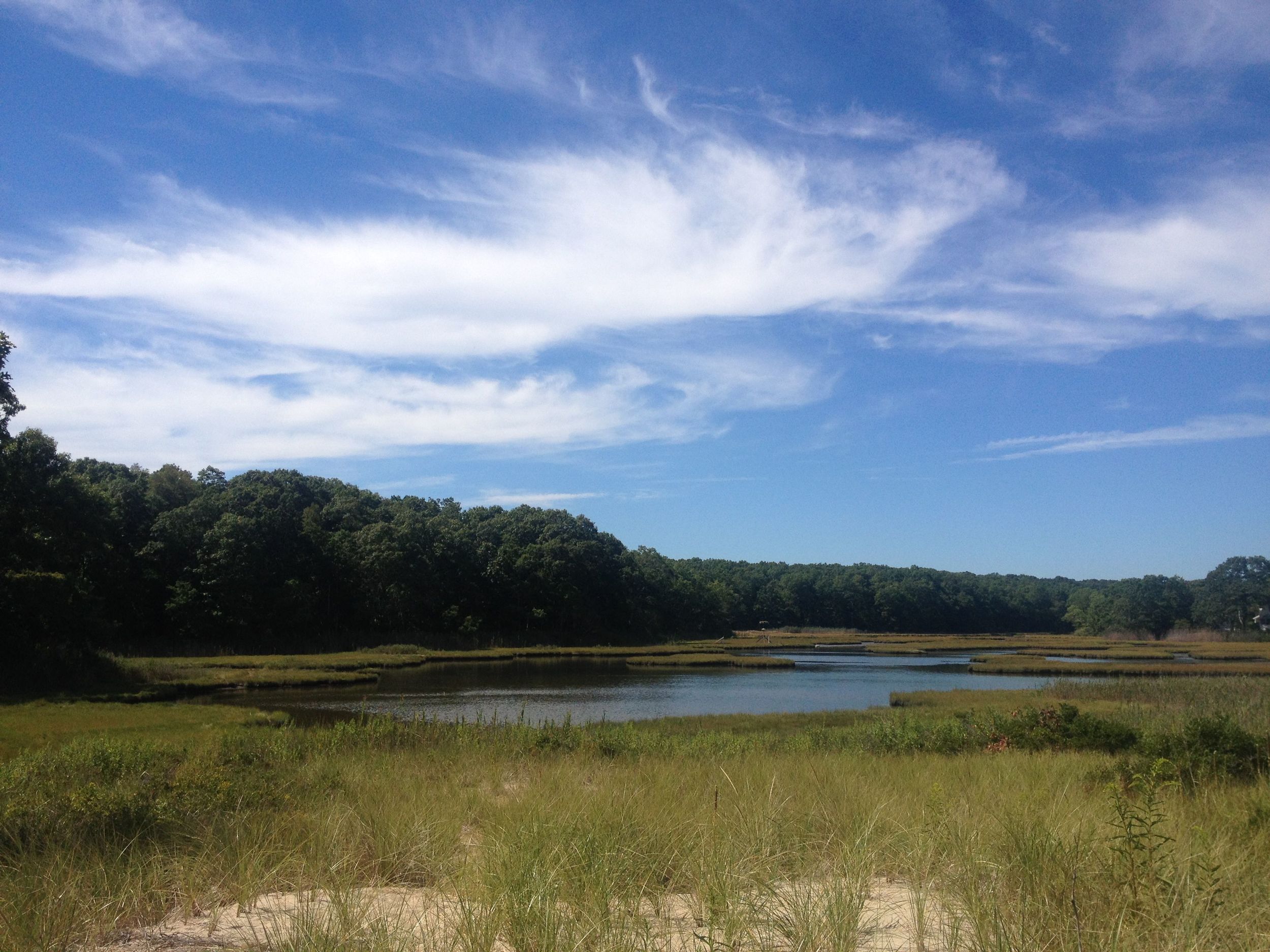 This marsh is part of Hubbard's Point. Egrets roost in the trees, osprey build their nests on poles, fish and eels travel up creeks to spawn, and the banks are rich with blue crabs. At this time of year migratory birds pass through, and the brush is full of warblers.
One morning, walking along the banks at low tide, I found the most iridescent blue crab claw I have ever seen. I stopped and took a picture. I'm still startled by the blue.
This marsh is part of Hubbard's Point. Egrets roost in the trees, osprey build their nests on poles, fish and eels travel up creeks to spawn, and the banks are rich with blue crabs. At this time of year migratory birds pass through, and the brush is full of warblers.
One morning, walking along the banks at low tide, I found the most iridescent blue crab claw I have ever seen. I stopped and took a picture. I'm still startled by the blue.
Cats in Connecticut
This summer the cats and I spent several weeks at Point O'Woods. Maisie was born in Old Lyme, so for her it was a homecoming. Emelina and Tim, the kittens, had never been, so it was their first time there all together. Being NYC cats, they're used to the confines of a Chelsea apartment. Going to the country was summer vacation for them.
They enjoyed the view and sea breeze.
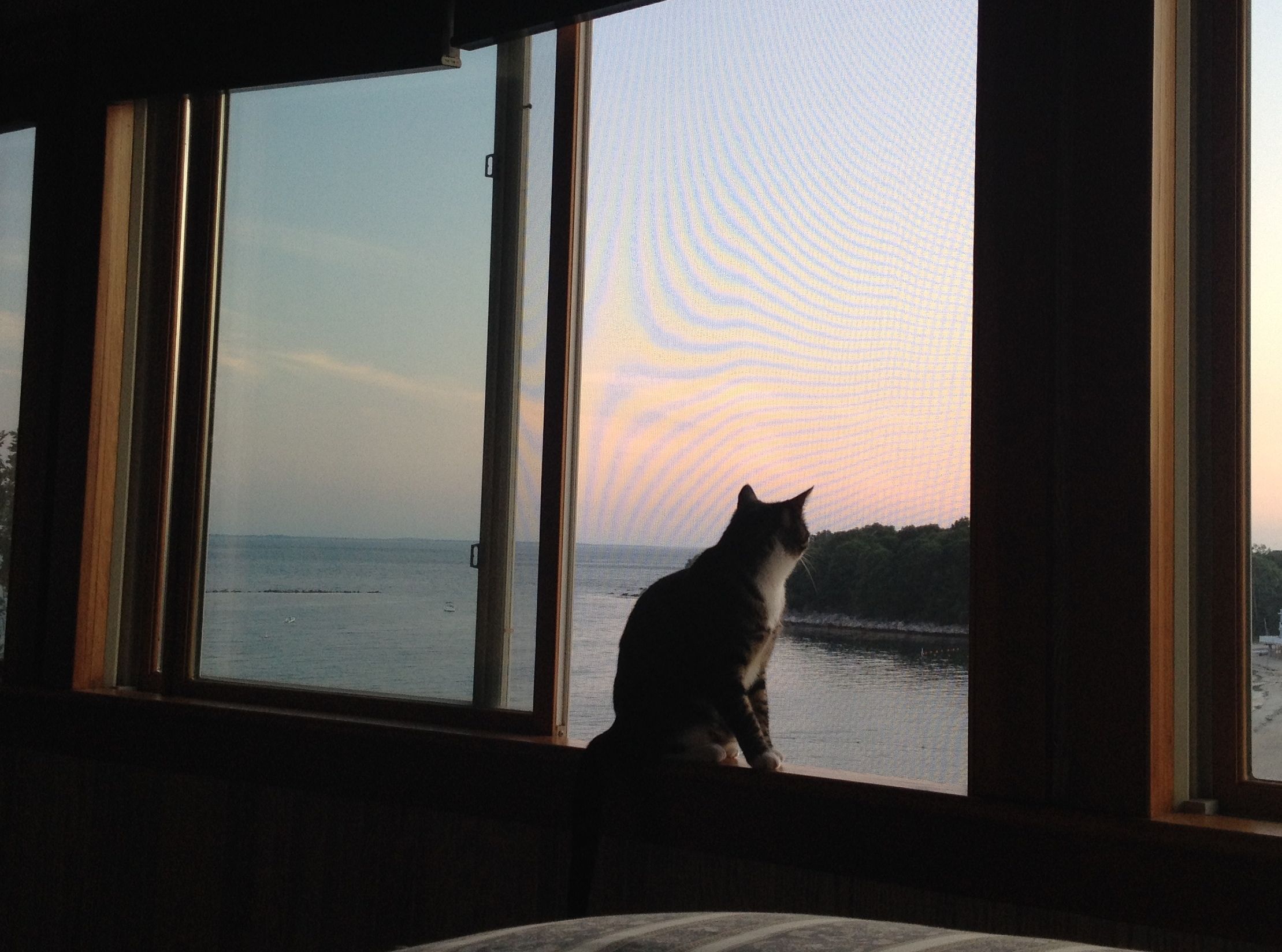

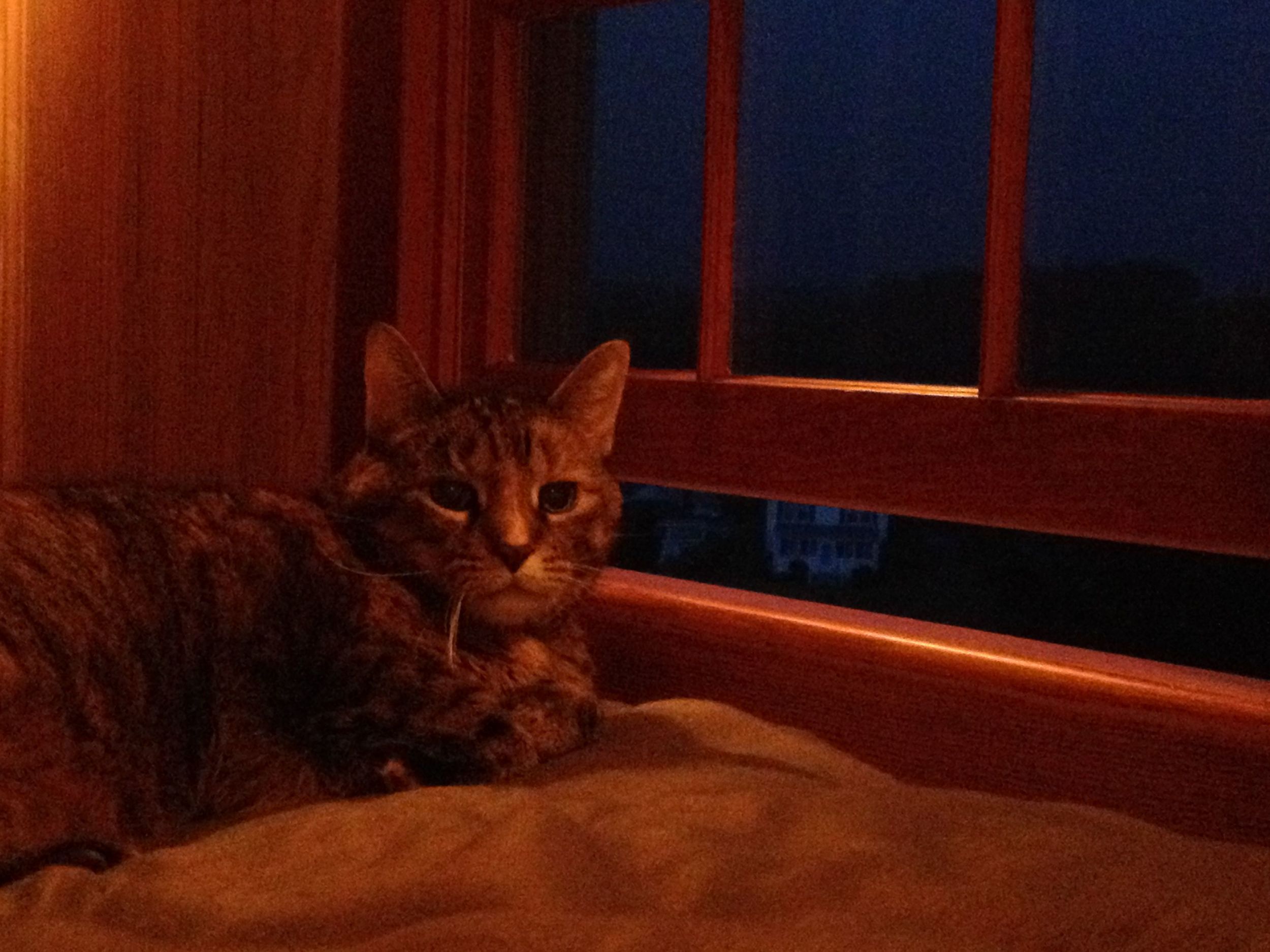

They found plenty of time for togetherness.


The kittens, especially Emelina, discovered their love of heights. 


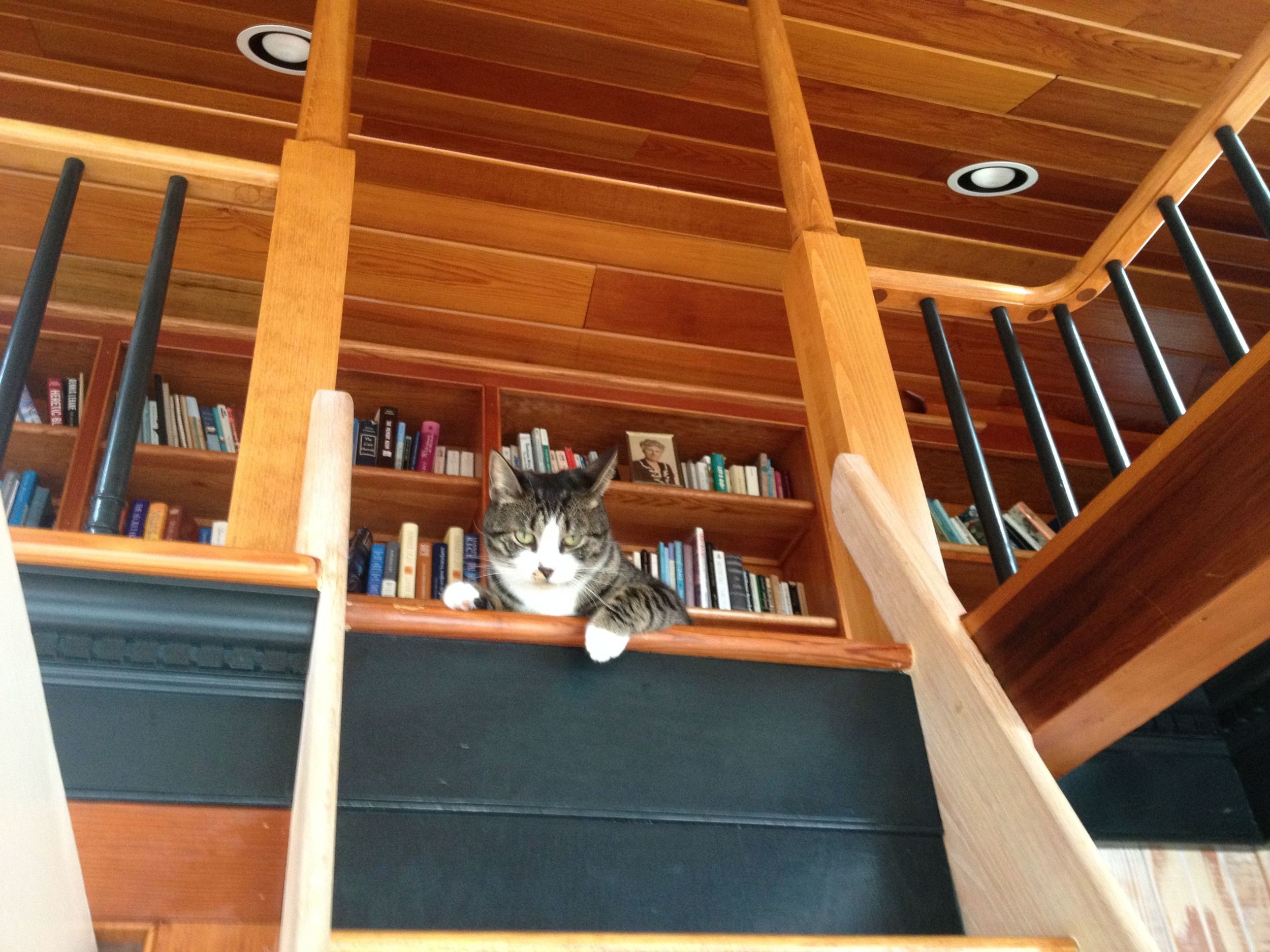


And Maisie returned to one of her favorite spots, a place she used to sit with the old girls, Maggie and Mae-Mae, on the back of the loveseat next to the fireplace, proving that--indeed--you can go home again.
A chance to meet with writing students...
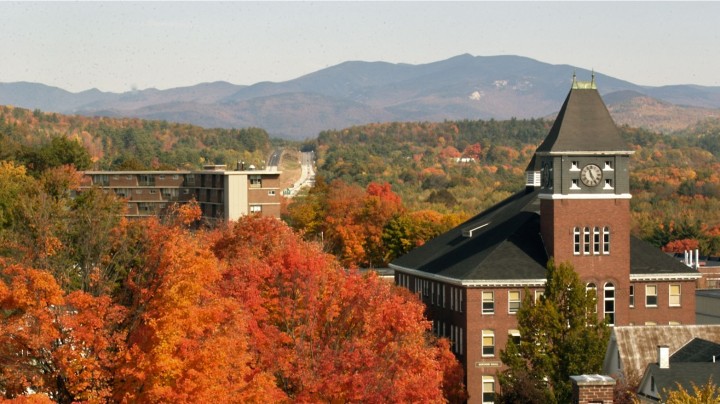 Speaking to students is one of my favorite things to do. There is something about meeting young writers, full of hope and ideas, and letting them know I believe in them, I know they can do it if they really want to. That seems to me to be the most important factor: desire. The desire to write, to express what's inside, to complete a work of fiction or non-fiction, to want it so badly you won't give up on yourself or the work.
Speaking to students is one of my favorite things to do. There is something about meeting young writers, full of hope and ideas, and letting them know I believe in them, I know they can do it if they really want to. That seems to me to be the most important factor: desire. The desire to write, to express what's inside, to complete a work of fiction or non-fiction, to want it so badly you won't give up on yourself or the work.
 When I was a child, my mother was getting her master's degree in education, and she practiced on my sisters and me. She would have writing workshops each summer morning, and we'd sit at the oak table in our cottage at Hubbard's Point. She'd tell us to write a story about crabbing at the end of the beach, or swimming out to the raft, or to compose a paragraph about the clouds in the sky, or something beautiful or ugly or enchanting or disturbing we'd seen that week. In that way, she helped us realize the dailiness of writing, the way our ordinary lives could add up to an essay or a story.
When I was a child, my mother was getting her master's degree in education, and she practiced on my sisters and me. She would have writing workshops each summer morning, and we'd sit at the oak table in our cottage at Hubbard's Point. She'd tell us to write a story about crabbing at the end of the beach, or swimming out to the raft, or to compose a paragraph about the clouds in the sky, or something beautiful or ugly or enchanting or disturbing we'd seen that week. In that way, she helped us realize the dailiness of writing, the way our ordinary lives could add up to an essay or a story.
Years later I began holding writing workshops--one day each summer, never planned in advance, just when the spirit moved me--and I'd invite children from Hubbard's Point to come to my house for a few hours of writing. Frequently the cats would join in, sitting on my desk (including Tim and Emelina, shown here in their favorite basket), and providing inspiration.
It is important to be steady and write every day--you must actually write and not just read about writing, dream about writing, or look online for other people writing about writing. You have to do it. And you have to train yourself to be good at it.
Thursday I had the privilege of speaking to Joe Monninger's English class at Plymouth State University. I met his students, told them what it's been like for me, talked about research, heard their questions about ways of writing, possibilities of publishing. Outside, the trees were turning red and gold, maybe the foliage was at its peak, and the sky over the White Mountains of New Hampshire was brilliant blue.
The Night Before
From bestselling author Luanne Rice, a haunting and emotional short story, never-before released, and free to all readers. On the eve of a wedding by the edge of the sea, a once-in-a-lifetime storm sweeps through a family farm on the Connecticut Shoreline and sets in motion the events of The Night Before.
Read MoreHappy Mother's Day
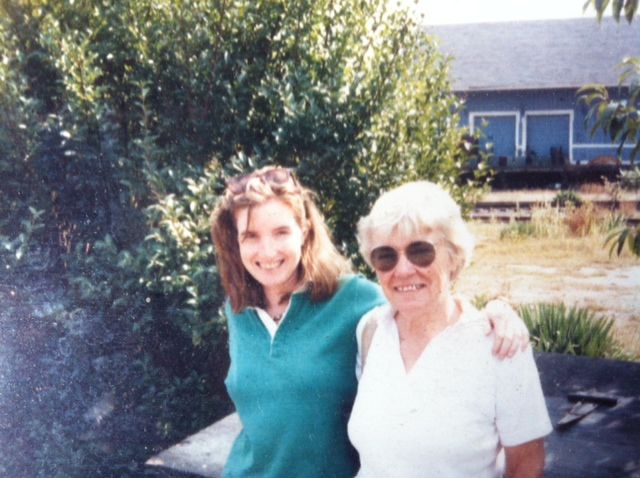 I miss my mother. I think of her every day. There are so many things I want to talk to her about. She had a unique sense of humor and I'll catch myself laughing at sights or phrases or stories that I know she'd so enjoy. So much of what I love in life came from her: gardening, swimming in the ocean, cooking, poems, English literature, art. I didn't inherit her talent for drawing and painting (although both my sisters did,) but I do have her love of art galleries and museums. So often I'll see an exhibit and think of her, and wish she were there to see the artist's work with me.
She loved the beach, and I'm sure that's one reason I'm happiest with bare feet, walking along the tide line. We would spend summer days building sandcastles, finding shells and sea glass, swimming to the raft, crabbing at the end of the beach. Often she would sketch while my sisters and I played and swam; frequently we'd all be reading, covered with sunscreen, lost in our books.
I miss my mother. I think of her every day. There are so many things I want to talk to her about. She had a unique sense of humor and I'll catch myself laughing at sights or phrases or stories that I know she'd so enjoy. So much of what I love in life came from her: gardening, swimming in the ocean, cooking, poems, English literature, art. I didn't inherit her talent for drawing and painting (although both my sisters did,) but I do have her love of art galleries and museums. So often I'll see an exhibit and think of her, and wish she were there to see the artist's work with me.
She loved the beach, and I'm sure that's one reason I'm happiest with bare feet, walking along the tide line. We would spend summer days building sandcastles, finding shells and sea glass, swimming to the raft, crabbing at the end of the beach. Often she would sketch while my sisters and I played and swam; frequently we'd all be reading, covered with sunscreen, lost in our books.
When I grew up and moved to New York City, I'd take Amtrak to Old Saybrook CT nearly every weekend. My mother would meet the train, no matter what time it was; Sundays came too soon, and I'd never want to leave. The photo above (taken in 1988 or so) shows us at the train station, waiting for the train back to NY. I read her expression and know she wasn't ready for me to leave. The picture brings back that moment and many emotions.
She died way too young, after a long illness. After her death I was filled with memories of nurses and hospitals and the great sadness of losing her slowly. But time has passed, and you know what? I rarely think of her illness anymore. The gift of time has been that I remember my mother being young and healthy, painting nearly every day, writing every night. I remember watching Julia Child on Saturday afternoons, then cooking dinner together--sitting around the table at Hubbard's Point, enjoying the meal with my sister and her family, laughing and talking and feeling that it would last forever, that our family would go on forever.
I wrote about her in an essay called "Midnight Typing." It appears in the collection What My Mother Gave Me, edited by Elizabeth Benedict.
And now it is May
And now it is May.
I grew up in Connecticut, and May was the month when everything turned green. Small leaves appeared on the trees. When "the leaves on the oak are the size of squirrels' ears" shad would start to run in the rivers. The first flowering trees were shadblum, also signifiers of shad, a fish that we ate one a year, more to celebrate spring and to have with young asparagus and buttered red potatoes than because we liked the taste.
We had many seasonal foods and traditions in our family, but right now I'm thinking of spring. My mother didn't like to cook, but she liked to watch Julia Child (she died before the Food Network came to be, but oh how she would have loved all the chefs and cooking shows.) Mim, our grandmother who lived with us, baked but didn't cook, the difference--as I see it--being that one strictly involved the oven and precise measurements, and the other requires slow burners, drifts of imagination, no certain regimen other than what is fresh, in season, and delicious.
You can probably tell I like to cook more than bake.
From the time I was fifteen I often cooked for my family. My school had "mini-week" every January, and we could choose from a slew of interesting classes not usually offered. My sophomore year I took French cooking. Sister Denise taught it in the convent next door. We made jambon persillade, coq au vin, blanquette de veau, and asperges au beure blanc. I'd learn how to prepare the meal at school, then go home and cook it for my family, with a stop at Sussman's market along the way.
Spring was a time to celebrate. There is so much beauty in every season, but the changes in spring literally feel like rebirth, the earth coming back to life. Many people speak of unbidden joy, a feeling of hope that wasn't there before. I feel a shadow. Maybe it's because my father died in April, or perhaps it's just that I am an Irish existentialist at heart, and I know not to get attached to the beauty because it will not be here forever. That's the problem, isn't it? Things won't be here forever.
But for now we have wisteria, tulips, new leaves, migrating warblers traveling the eastern flyway in great numbers, landing in our yards and parks to rest on their way north to the boreal forest. Just yesterday Anders Peltomaa reported seventeen warbler species in Central Park including a Yellow warblers, a Yellow-throated warbler, Black-and-white warblers, a Palm warbler, a Chestnut warbler and a Canada warbler. (Large numbers, the migration definitely in full swing, a "fall-out"--literally, many migrants dropping from the sky--because of the storms we have been having.)
In the woods we have elusive wildflowers such as bloodroot, trillium, Jack-in-the-pulpits. In the streams we have shad. They are swimming up the Connecticut River in their annual and mysterious migration. They are plentiful, but hard to find in fish markets because they are the devil to bone. Those who can properly filet a shad are few and far between; it's a lost art. The taste of shad is not for everyone: it reminds me of bluefish. Enough said? It's an oily fish and, on the plus side, rich in Omega 3 fatty acids.
Some people, including Nero Wolfe, love shad roe.
So if you can find shad and if you like it, or if you dare, I share with you here my menu--cooked once a year, in May, when shad are running, when oak leaves are no bigger than squirrel's ears. Mim loved it, so I've named it for her. Happy May!
Mim's Baked Shad
1 shad filet per person
1 cup whole wheat bread crumbs, freshly crumbed in a Cuisinart or your favorite food mill-type apparatus.
olive oil
fresh lemon juice and zest
salt and pepper
Preheat oven to 350. Dry shad filets with paper towel and lay skin-side down in baking dish. Sprinkle with salt and pepper and a dash of fresh lemon juice. Mix bread crumbs with olive oil, enough to moisten--do use whole wheat bread because it's more full bodied and will work better with the strong flavor of shad. Add a little more salt and pepper, and a half teaspoon or so of lemon zest to the bread crumbs, then divide the mixture among the shad filets, spreading it on top, not too thin, you don't have to be artful, this is mainly seasoning.
Bake for 30 minutes or till cooked through and bread crumbs golden brown. (Check while baking, and if the bread crumbs are getting too dark, you can cover loosely with a piece of tin foil.)
Asparagus
The asperges au beurre blanc recipe from Sister Denise involved hard-boiled eggs, which I don't like. But if you do, you can just peel and rice a hard-boiled egg and put it on top for garnish.
Bunch of asparagus
beurre blanc (or olive oil)
Bring pot of water to boil. Prepare asparagus by holding each stalk between two hands, bending till it breaks. It will break in its natural spot, just throw away the tough inch-or-two from the bottom. Add asparagus to boiling water. (Salt the water if you like, I don't think the asparagus needs it.) Cook until the asparagus is bright green, easily pierced with the tip of a knife--5-8 minutes.
Now, you can serve the asparagus straight out of the pot if you want. Or you can drizzle it with a small amount of olive oil. Or if you are fifteen and want to impress your family and by the way feed them very well, you can serve it with beurre blanc. Don't forget to add the chopped hard boiled eggs IF and only if you like them.
Beurre blanc
1 shallot, chopped fine
4 ounces white wine
fresh juice of 1/2 lemon, strained
1 tablespoon heavy cream
12 ounces cold unsalted butter, 1/4 inch slices
salt and white pepper
Combine shallots, wine, and lemon juice in non-reactive saucepan and cook over high heat until simmered down to 2 tablespoons. Add the cream and cook until the sauce bubbles. Add butter, 1 slice at a time, whisking over low heat. Whisk continuously until all butter is added and sauce is emulsified. Pour over asparagus. This is where you garnish with hard boiled eggs if desired.
Red Potatoes á la Hubbard's Point
This is my favorite part, a vehicle for the rest of the meal. It's a very casual and most delicious dish, and requires guests to participate, in that they'll have to peel their own garlic at the end, when served.
A pound or two of the tiniest, reddest new potatoes you can find
olive oil
sea salt and freshly ground pepper
cloves of garlic--don't bother peeling them
sprigs of fresh rosemary
Preheat oven to 400. You want it hot.
Do not wash or peel potatoes. If necessary clean them with a dry cloth or paper towel. Cut in half or quarters, depending on how large. You want them to be about the size of a walnut. Spread olive oil on cookie sheet--don't stint. You'll use a lot, but it won't be absorbed, so you won't be consuming that much--it's for flavor and browning.
Place cut potatoes on cookie sheet, rolling in olive oil until well-covered. Add unpeeled cloves of garlic. Season with sea salt and freshly ground pepper. Add a couple of springs of rosemary--in one piece, not broken up.
Insert sheet into oven. As soon as you hear the oil starting to sizzle, after 10 minutes or so, remove pan and with a spatula turn the potatoes so they don't stick to the pan and so they brown on all sides. Do this a few times over about 30 minutes--cooking time depends on size of potatoes. You want to cook them until they are crispy.
Serve with cloves of garlic straight from the pan, still in their jackets, and tell your guests to peel them themselves. It will be fun for them, easier for you, and the garlic will taste delicious with the potatoes and shad, or even spread on slices of baguette.
Happy Mother's Day!
 I miss my mom. I think of her every day. There are so many things I want to talk to her about. She had a unique sense of humor and I'll catch myself laughing at sights or phrases or stories that I know she'd so enjoy. So much of what I love in life came from her: gardening, swimming in the ocean, cooking, poems, English literature, art. I didn't inherit her talent for drawing and painting (although both my sisters did,) but I do have her love of art galleries and museums. So often I'll see an exhibit and think of her, and wish she were there to see the artist's work with me.
She loved the beach, and I'm sure that's one reason I'm happiest with bare feet, walking along the tide line. We would spend summer days building sandcastles, finding shells and sea glass, swimming to the raft, crabbing at the end of the beach. Often she would sketch while my sisters and I played and swam; frequently we'd all be reading, covered with sunscreen, lost in our books.
I miss my mom. I think of her every day. There are so many things I want to talk to her about. She had a unique sense of humor and I'll catch myself laughing at sights or phrases or stories that I know she'd so enjoy. So much of what I love in life came from her: gardening, swimming in the ocean, cooking, poems, English literature, art. I didn't inherit her talent for drawing and painting (although both my sisters did,) but I do have her love of art galleries and museums. So often I'll see an exhibit and think of her, and wish she were there to see the artist's work with me.
She loved the beach, and I'm sure that's one reason I'm happiest with bare feet, walking along the tide line. We would spend summer days building sandcastles, finding shells and sea glass, swimming to the raft, crabbing at the end of the beach. Often she would sketch while my sisters and I played and swam; frequently we'd all be reading, covered with sunscreen, lost in our books.
When I grew up and moved to New York City, I'd take Amtrak to Old Saybrook CT nearly every weekend. My mother would meet the train, no matter what time it was; Sundays came too soon, and I'd never want to leave. The photo above (taken in 1988 or so) shows us at the train station, waiting for the train back to NY. I read her expression and know she wasn't ready for me to leave. The picture brings back that moment and many emotions.
She died way too young, after a long illness. After her death I was filled with memories of nurses and hospitals and the great sadness of losing her slowly. But time has passed, and you know what? I rarely think of her illness anymore. The gift of time has been that I remember my mother being young and healthy, painting nearly every day, writing every night. I remember watching Julia Child on Saturday afternoons, then cooking dinner together--sitting around the table at Hubbard's Point, enjoying the meal with my sister and her family, laughing and talking and feeling that it would last forever, that our family would go on forever.
I wrote about her in an essay called "Midnight Typing." It appears in the collection What My Mother Gave Me, edited by Elizabeth Benedict. Please comment below for the chance to win a copy of the book as well as a canvas tote bag printed with the cover of The Lemon Orchard. I'd love to know about your mother, hear your stories and memories.
[UPDATE 5/12: Congratulations to Leela FitzGerald, our Mother's Day winner!]
The Locals
Whenever Old Lyme threw a literary gathering, the writers would usually be the locals: Dominick Dunne, David Handler, and me. What a thrill I felt to be included with them. And I was always as entertained as the audience: they were as smart and funny as storytellers come. All three of us set novels in town; Dominick's fictional Old Lyme was Prud'homme, David's is Dorset, and mine is Black Hall, with the beach area of Hubbard's Point.
Earlier this summer when David and I discovered each other on Facebook, we had a happy online moment. It turned bittersweet as we spoke of Dominick and how we miss him.
Old Lyme's light is dreamy, reflecting off Long Island Sound, the Connecticut River, and all the tributaries, ponds, salt meadows, and marshes. Lyme Street runs through the village, lined with charming saltboxes, stately white colonial houses, stone walls, and gardens, one more seductive than the next.
There's an unquestionable reserve about our town, mystery behind the picket fences. Such a delicious place to set novels. No wonder David's are mysteries.
David has a brand new blog; I read the post while away from Old Lyme, and it made me homesick for everything about the town. I hope we're asked to speak together again before too long. I really want to hear him tell the Sid and Nancy, well more Nancy, story again. Also, and I bet David doesn't know this, the reason I got a Fender Stratocaster is directly linked to why his character Mitch Berger first acquired his.
Dominick was wickedly witty and kind and direct and famous. He knew everybody and traveled all over, and I think he really considered Old Lyme to be his sanctuary. I loved his writing and consider his Vanity Fair article, Justice, about the murder of his daughter Dominique, to be one of the most riveting, honest, unforgettable pieces I've ever read.
What a time, what a town. I want to stop by the Phoebe Griffin Noyes Library and get lost in some research, and I definitely need to play my Strat more often.
Random wonderful thing
A great beach friend from childhood and, in some ways, even before--our parents had been friends when they were young, and our grandparents before that--posted on my facebook page today. We were reminiscing about Helen Hubbard--a neighbor who lived on the Point, and for whom my fictional beach town "Hubbard's Point" is named. Betty reminded me of how we used to crouch under Helen's window to listen to her practice. Helen was an opera singer and voice teacher, and when she sang it was beach music--as much a natural sound as seagulls and wind blowing through the pine needles. Once or twice a summer she would give recitals and invite grownups from the Point. That didn't stop us kids from sitting outside and enjoying the performance.
Betty and her sisters and brother and my sisters and I were across-the-road neighbors, and pretty much inseparable from Memorial Day through Labor Day. We loved summer and each other. The beach was OURS. As I wrote back to her, we swam and laughed all day. Mim, my grandmother, and her great-aunt Florence would hang out together too, tell old stories, go for swims in their skirted bathing suits and white bathing caps.
When Betty's family visited Ireland--often--they would come home with Irish linens, wall-hangings, and tea towels. My cottage is still filled with the many gifts they brought us.
Her family had a party every Labor Day. Such a bittersweet gathering! The weather would still be summery, but fall and school and--especially-leaving the beach--were in the air. We'd walk down the steep steps from their cottage to glacial rock ledge sloping into Long Island Sound. Black-eyed Susans, bright pink sweet peas, and lavender flowered spearmint grew at the top of the rocks. A picnic table would be set with plates of sandwiches, platters of sliced honeydew and musk-melon, and--the piece de resistance--Aunt Florence's soda bread and blueberry buckle.
We'd make that party last as long as possible, because as soon as it was over it was time to pack the station wagon and head up to New Britain for the school year.
As Betty says, our memories are a treasure in themselves. She is so right. Just connecting with her today makes me remember everything, and smile, and feel so happy. I wish I had a picture of us all as children--if I did, no doubt our hair would be wet, someone would be adorned with seaweed, there'd be sunglasses, flip-flops, and a few Good Humors in the picture. And we'd be doing our best and not succeeding to keep from laughing.
Secret path
Hidden paths don't reveal themselves often. They're best when you stumble upon one far from home, away from the familiar. Taking a walk you might catch sight of of a shadowy opening, calling you to duck through a canopy of interlocked branches, or through an up-island gorse-covered dune Do you accept the invitation, follow the path? I've done that many times. They've led to buried treasure. Not pirate's gold, but beautiful sights I wouldn't otherwise have seen.
On Swan's Island, Maine, through the thickest pine forest, the almost invisible narrow path paved with soft, golden needles, leading to a private crescent beach.
In Normandy, uphill through an apple orchard, to the crest with a view of wildflower fields, once painted by Boudin and Monet, sloping down to the English Channel. Other byways through gardens, Impressionist landscapes filled with light and flowers.
In Ireland, in Youghal, following a path within sight of the River Blackwater, coming upon a medieval church dating back to St. Declan and the year 450.
Another day in East Cork, the Ballycotton Cliff Walk, a steep climb from the road, leads along the coast, high above the sea, with views of small islands grazed by sheep and goats, sea birds including terns and fulmars riding the air currents, white gannets plunging down into the rough blue sea, and the Old Head of Kinsale shimmering in the distance. That walk, and a day spent in Kinsale, provided much inspiration for The Silver Boat.
Our own Cliff Walk in Newport, Rhode Island, a mystical experience every time I take it, whether on a brilliant September day, or a snowy December dusk, or the hottest August morning. Cliff Walk has figured in at least three novels of mine (Angels All Over Town, What Matters Most, The Geometry of Sisters) and probably more... It hugs the coast for ten miles, past mansions of the gilded age on one side, the wild Atlantic on the other, through tunnels, past Marble House's Chinese Tea House.
Perhaps most dear to me, and not at all far from home: the secret path in all my Hubbard's Point novels, leading to a hidden beach where people fall in love and pick beach plums to make tea and jelly and see shooting stars and take midnight swims under the full moon's silver light.
(Painting by Claude Monet, Garden Path at Giverny.)
Child's Vow
I am thinking of someone lost to me. The stories we told each other, the ghosts we summoned. We thought it would last forever. I don't even know what "it" is: our home, our closeness, our lives together. As she would say, "Nobody knows how I feel."
To love a place so much it hurts. When I go there I am haunted by someone ten miles down the road. Our mother used to say, "You'll have many friends, but only two sisters." Hey--Willoughby Moon. Going to keep this up forever? This seems an appropriate day to ask. M's summer birthday.
A favorite poem, and I know you get it. The beach is the valley our fathers called their home. Lost love...
Under Saturn by William Butler Yeats
Do not because this day I have grown saturnine Imagine that lost love, inseparable from my thought Because I have no other youth, can make me pine; For how should I forget the wisdom that you brought, The comfort that you made? Although my wits have gone On a fantastic ride, my horse's flanks are spurred By childish memories of an old cross Pollexfen, And of a Middleton, whose name you never heard, And of a red-haired Yeats whose looks, although he died Before my time, seem like a vivid memory. You heard that labouring man who had served my people. He said Upon the open road, near to the Sligo quay - No, no, not said, but cried it out - 'You have come again, And surely after twenty years it was time to come.' I am thinking of a child's vow sworn in vain Never to leave that valley his fathers called their home.
There's No Place Like Home (An Earlier Perspective on the Subject)
Another perspective on Hubbard’s Point… There's No Place Like Home
By Luanne Rice
In the spirit of full disclosure, I should tell you that several years ago I bought the beach cottage where my family spent every summer; this proverb is that dear to my heart. A small grey-shingled house perched on a rocky ledge overlooking Long Island Sound, it is shaded by oaks and pines, smelling of salt and beach roses. After a long winter in New York City, I walk through the kitchen door, and a lifetime of memories floods over me.
My maternal grandparents built the house in 1938, just in time to withstand the brutal hurricane roaring up New England’s coast. My father’s family owned a cottage just up the road; he met my mother the summer after he returned from World War II. It was a rainy day, and he and his mother were sitting on the screen porch. As the family story goes, my mother went striding by (I love that they use that word—“striding”—I can just see her) in a yellow rain slicker, and my future grandmother urged her son to go after her in the car, and offer her a ride.
He did, and they got married, and my sisters and I were born. We lived inland during the winter, but every June we’d pack up the station wagon and head for the beach. My grandmother let us plant the window boxes; my mother gave us each a section of the herb garden to plant; my father taught us how to fish. My cousins would be a two-minute walk away at my grandfather’s cottage, and we’d all go swimming and crabbing together. We looked forward all year till the August meteor showers, when we’d lie on the beach and wish on shooting stars.
My Aunt Jan has a party every year, on the date of her father’s birthday. Pop died long ago, but the last weekend in August, his house and yard are alive with his grandchildren and great-grandchildren.
“Home” can encompass more than a dwelling—it can be a gathering, an activity, a state of mind—a moment that tells you who you are, where you come from. During last year’s party, I took my cousins’ children—twelve of them—for the time-honored Rice family tradition of blue crabbing in the swamp, at the far end of the beach. Armed with nets and drop lines, buckets and bait, we waited till the tide was right, and then trudged through the tall grass to the creek.
We lined the banks. Sun beat down on our heads. I remembered my father telling me to be still, that my shadow would scare the crabs away. I could almost feel my sisters beside me, our bare feet silver with silty mud, thrilled by the sight of blue shells skulking through the shallows.
Last summer, it all came back. Nothing can conjure childhood memories like hanging out by a tidal creek with twelve young cousins. I felt so happy to show them what I knew, to watch them catch and release more crabs than we could count. We took time out to watch egrets in the pond, to follow an osprey as it circled overhead. Two of the older kids went exploring, and found the Indian Grave that my sisters and I had often visited so many summers earlier.
Many of the people I loved so much are gone. My grandparents, my mother and father, some of my aunts and uncles and cousins. As often as memory makes me smile, it makes me sad for those I’ll never see again. I think that that is one of the secrets of life: to know that it all goes by so fast, that sometimes we have to let go of people we love before we are ready.
Ergo: the ruby slippers. Thank goodness we all have a pair. Your mother’s brownie recipe, your grandmother’s quilt, the picture of you and your sister at the State Fair. Click your heels three times…
My cottage has withstood many hurricanes since 1938. So have I, so has my family. I’ve lived in big cities and small towns, made more mistakes than I can count, roamed far and wide, lived a complicated life. One thing I can always count on is the feeling of peace that overtakes me when I climb the steps, up the hill to my cottage.
I see the 1938 penny my grandfather pressed into the step’s mortar; I smell the rosemary, thyme, and mint from my mother’s herb garden; I feel the salt breeze that has so often blown my troubles away, that has inspired me with countless stories…and I feel in my heart what I know to be true: there’s no place like home.
Summer's Child
A powerful novel of a mystery, a love affair, and a bond that cannot be broken set in a seaside town where miracles are made. On the first day of summer, Mara Jameson went out to water her garden–and was never seen again. Years after her disappearance, no one could forget the expectant mother.
Read MoreNo Woods
The area is called Point O' Woods, but now it might as well be called Point O' No Woods. The new houses have air-conditioning—who needs the sea breeze, and who needs shade? Instead of the rustle of leaves overhead, walk down the road and hear the low, constant hum of a big air-conditioning unit.
Read MoreLast Kiss
Is it true that old love never dies, that hearts can mend, that a secret revealed can change everything? Luanne spins a mesmerizing tale readers will long remember–the powerful story of a close-knit community grappling with a dark mystery, and of a woman reclaiming a love she believed lost a lifetime ago.
Read MoreFirefly Beach
Coolly sophisticated and steadfastly single, Caroline Renwick has always been the sister everyone could count on. As she and Clea and Skye gathered at Firefly Hill, their childhood home, Caroline thought that they had all put the past behind them. But as summer gets under way, a mysterious man arrives—a man who has the power to bring it all back...
Read MoreSafe Harbor
Haunting and powerful, Safe Harbor is an unforgettable story of family bonds, love lost and found, and of a painter's unfolding vision of herself, as an artist -- and as a woman. Set on the timeless New England coastline that Luanne has made her own.
Read More

